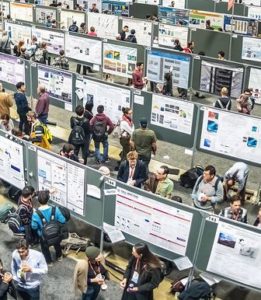Strengthening Our Science: AGU Launches Ethics and Equity Center
 In the next century, our species will face a multitude of challenges. A diverse and inclusive community of researchers ready to lead the way is essential to solving these global-scale challenges. While Earth and space science has made many positive contributions to society over the past century, our community has suffered from a lack of diversity and a culture that tolerates unacceptable and divisive conduct. Bias, harassment, and discrimination create a hostile work climate, undermining the entire global scientific enterprise and its ability to benefit humanity.
In the next century, our species will face a multitude of challenges. A diverse and inclusive community of researchers ready to lead the way is essential to solving these global-scale challenges. While Earth and space science has made many positive contributions to society over the past century, our community has suffered from a lack of diversity and a culture that tolerates unacceptable and divisive conduct. Bias, harassment, and discrimination create a hostile work climate, undermining the entire global scientific enterprise and its ability to benefit humanity.
As we considered how our Centennial can launch the next century of amazing Earth and space science, we focused on working with our community to build diverse, inclusive, and ethical workplaces where all participants are encouraged to develop their full potential. That’s why I’m so proud to announce the launch of the AGU Ethics and Equity Center, a new hub for comprehensive resources and tools designed to support our community across a range of topics linked to ethics and workplace excellence. The Center will provide resources to individual researchers, students, department heads, and institutional leaders. These resources are designed to help share and promote leading practices on issues ranging from building inclusive environments, to scientific publications and data management, to combating harassment, to example codes of conduct. AGU plans to transform our culture in scientific institutions so we can achieve inclusive excellence.
Resources Including Access to Legal Consultation
A key new offering from AGU to be featured through the Center is a pilot initiative to provide free access to consultation with a legal advisor, available to AGU students, postdocs, and untenured faculty members experiencing harassment, bullying, discrimination, retaliation, or other misconduct. Many victims of harassment report feeling alone, scared, ignored, and betrayed. This free legal consultation service is intended to let targets know that they are not alone and to help them chart a course forward. This pilot program is unique in the science community, and we look forward to measuring its benefits.
Overall, the AGU Ethics and Equity Center is designed to help you meet your ethics goals. In addition to the resources described above, visitors will find professional development and ethics-related resources for individual scientists and students, as well as information for organizations and institutions that are looking to implement best practices or update their codes of conduct. The Center will also be a home for information on upcoming ethics and equity–related workshops, as well as a place where groups can request custom workshops tailored to their own specific needs.
A Partnership Effort
The AGU Ethics and Equity Center is a natural progression from the update of AGU’s ethics policy 2 years ago to recognize sexual harassment as scientific misconduct, and our additional AGU policies and practices implemented since then. Led by AGU, the Ethics and Equity Center benefits greatly from partnerships with the National Center for Professional & Research Ethics, the American Geosciences Institute, the Association for Women Geoscientists, the Carnegie Institution for Science, the Earth Science Women’s Network, the Geological Society of America, the International Association for Promoting Geoethics, and the Ecological Society of America. By partnering in this effort, organizations help build and support workplace excellence across the total science community. The ongoing strategic direction of the AGU Ethics and Equity Center will be overseen by an advisory group of ethics experts and experienced leaders from across scientific disciplines and sectors.
Through the AGU Ethics and Equity Center and as a Centennial initiative, we hope to inspire and aggressively support a more vibrant, equitable, and inclusive Earth and space science community into the future. Science is strongest when a diverse set of voices are not simply at the table or in the lab but encouraged to share their perspectives and scientific ideas. We all benefit from more diverse viewpoints to improve our science as we look to another wonderful century of discovery and science for humanity.




There are no comments
Add yours